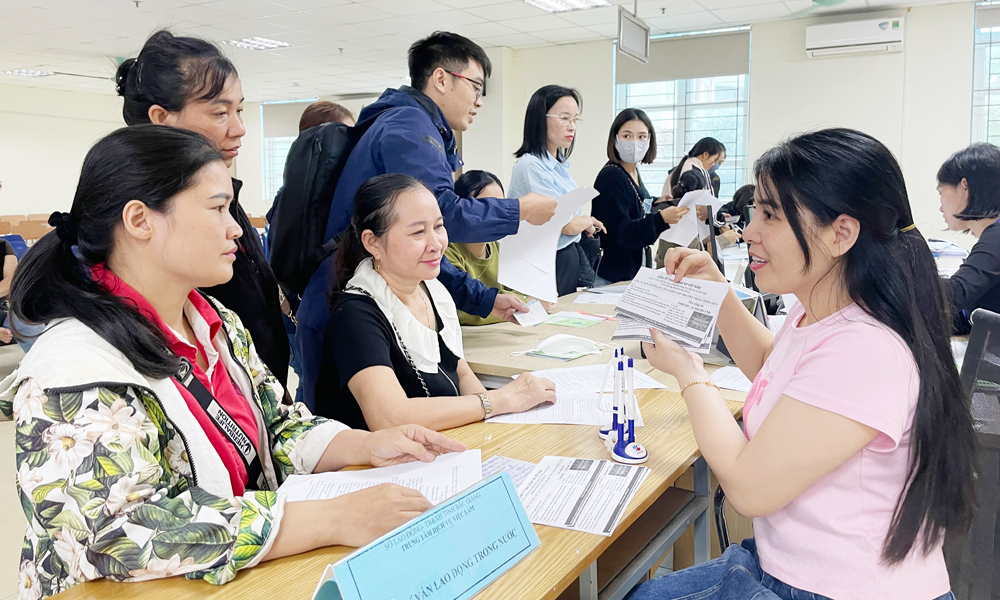Creating motivation for national contributors to rise up
Houses of gratitude
The family of Vu Hong Chuong (80 years old), a war invalid in Nam Son village, Nam Duong commune (Luc Ngan district), lives in a small and degraded house. His life is difficult and deprived. For many years, his family was classified as a poor household and a near-poor household since 2019.
 |
|
A leaders of the provincial Department of Labour, Invalids and Social Affairs hands over money from the provincial Gratitude Fund to support the house construction for war invalid Bui Van Sinh (left) who is being cared for at the provincial Nursing Center for people with meritorious services to the nation. |
According to Nguyen Manh Ha, head of the Division of Labour, Invalids and Social Affairs of Luc Ngan district, the whole district still has seven poor and near-poor households who are national contributors. With the goal of eradicating poverty for all of them this year, the division has advised the district People's Committee to develop an implementation plan and specifically grasp the situation to call for social sources and take suitable forms of support.
Chuong's family is one of two near-poor households with housing difficulties that will be supported by the association of Luc Ngan people in Hanoi to renovate the house with a total cost of 120 million VND (5,170 USD).
Since the inauguration of the new house (April 2022), the health of Duong Thi Tu (born in 1983), in Nha Nam township (Tan Yen district) seems to have improved. The 70sq.m house with a clean toilet has helped Tu and her daughter gradually settle down. Tu is a second generation AO victim. Her father, Duong Van Luan (born in 1947), was infected with the toxic chemical during the time fighting in Quang Tri battlefield.
Mobilizing social sources, supporting right persons
According to a report of the Division for National Contributors under the provincial Department of Labour, Invalids and Social Affairs, the province is currently managing more than 159,800 dossiers of national contributors. Of them, more than 25,700 people and their relatives are receiving monthly allowances.
 |
|
Leaders of Nha Nam township and the Association of Victims of Agent Orange/dioxin in Tan Yen district deliver money to support the construction of a house for Duong Thi Tu's family. |
According to Pham Trong Y, head of the division, the province has more than 3,000 households of national contributors supported to build and repair houses, with a total cost of more than 100 billion VND (4.3 million USD) (including the central and local budgets). Especially, with the motto of “the community joining hands”, since 2013, more than 1,000 national contributors have had their houses renovated at a cost of nearly 30 billion VND from the "Gratitude" funds at all levels.
Towards the 75th anniversary of Invalids and Martyrs' Day on July 27 this year, the Department of Labour, Invalids and Social Affairs advised the provincial People's Committee to issue a plan to support poverty eradication for 44 poor households and 136 near-poor households who are national contributors in 2022. Among them, 40 face difficulties in housing.
Bui Quang Phat, Deputy Director of the Department of Labour, Invalids and Social Affairs said amid limited budgets at all levels, in order to accomplish this goal, in addition to instructing localities to deduct the "Gratitude" funds to prioritize care for disadvantaged national contributors, the unit has actively coordinated with other agencies, Fatherland Front committees and socio-political organizations to maximize social sources, helping them soon stabilize their lives.
In order to effectively implement the ordinance on preferential treatment for people with meritorious service to the revolution, especially support housing improvement and ensure that their living conditions are equal to or higher than the averages, authorities at all levels, sectors and localities will promote communications to spread gratitude-paying activities, making it the responsibility of each individual and the whole community. In particular, it is necessary to maximize social sources, in combination with budgets, to support disadvantaged policy beneficiary families to settle down and improve their lives.
 Bắc giang
Bắc giang













Reader's comments (0)